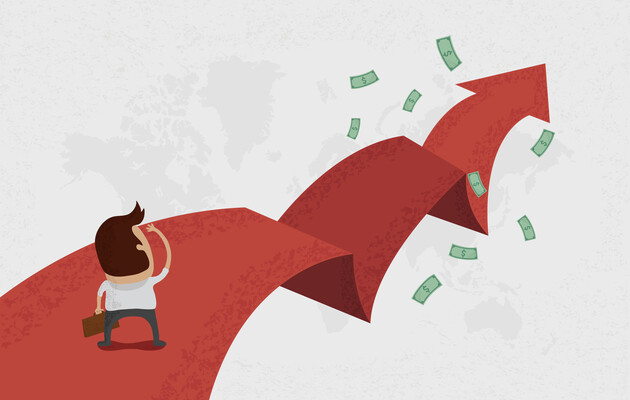Our economy is more resilient than we thought, but there is also a lot of work ahead
There is good news and a large-scale task. The news is that Ukraine’s GDP last year did not collapse as significantly as Western analysts predicted. Even the most optimistic NBU and IMF did not expect that GDP would exceed 4.9 trillion hryvnias, and in the end we reached almost UAH 5.2 trillion, which is quite comparable to the indicators of the “recent” years of 2019 and 2020. Our economy is more resilient than we thought. But there is also a large-scale task: to provide this economy with investment development in extremely difficult conditions.
Thanks to the heroic efforts of the real and public sectors, we managed to prevent the catastrophic consequences and losses of GDP, prophesied by both foreign and domestic experts, to ensure the smooth operation of not all but many industries and the effective functioning of social services. However, in addition to direct losses, Ukraine continues to experience losses in economic growth. In the first quarter of the current year, the revenues of the general fund of the state budget (excluding grants) were 11% lower than last year; if inflation is taken into account inflation, the decline is 29%. Investment activity in the country decreased to 11% of GDP while the level of lending to the economy contracted to 13% of GDP. The decline in aggregate and consumer demand hit incomes in the real sector, which was forced to cut jobs, thus leading to an even greater decline in household income and consumer demand. So we still have a lot of very difficult tasks to be dealt with.
An important achievement of the last period was the approval of a new Program with the IMF. It is emblematic that according to the forecast published by the International Monetary Fund under the new Extended Fund Facility program for our country, Ukraine’s average annual rate of economic growth for the period until 2033 will average about 4%. It is clear that getting out of the spiral of economic decline requires a change in the parameters of state economic policy and the introduction of effective measures to increase the multiplication of resources involved in the recovery of the country’s economy.
One of the most important challenges for the domestic economy here is a critical increase in its dependence on imports, which leads to an increase in the deficit in the trade balance and carries risks for currency stability. In 2022, export deliveries of goods decreased by 40%, whereas imports shrank by only 20%. Approximately the same ratio is observed this year. As a result, the negative foreign trade balance rose to the level of 21% of GDP. In 2023, the annual volume of goods imports will amount to almost $60 billion, or about 40% of GDP (together with services — almost 60% of GDP). At the same time, the official data on imports, for obvious reasons, is not complete since it does not reflect all the volumes of military supplies, so even this 60% may turn out to be a very modest figure.
However, at the same time, the restoration of destroyed critical infrastructure and the reconstruction of the economy generate a potentially high permanent demand for investment goods, which cannot be provided by domestic production alone. The physical volume of industrial output in Ukraine decreased by 37% last year alone, and by 50% over the last ten years (compared to 2013). Accordingly, domestic demand for economic recovery will increasingly be met by imports, which increases pressure on international reserves and the exchange rate.
What has to be done
The answer is unequivocal — vigorous investment development. According to the above-mentioned Memorandum with the IMF, the cumulative increase in investment in the years 2024-2033 will amount to only about $40 billion, or less than 10% of the volume of investment necessary to cover the losses from the war. Therefore, only a large-scale job creation policy with the support of funds from international partners can strengthen the competitiveness of the military economy, protect it from future currency, economic or social crises.
What has already been done
In conditions of limited availability of financial resources and dependence on foreign aid, the government is implementing state programs aimed at easing the burden of losses for the country’s economy and population.
Under the “Own Business” (Vlasna sprava) grant program, Ukrainians can receive a micro-grant from UAH 50,000 to 250,000 for the purchase or leasing of equipment, the purchase of raw and other materials and the rental of premises. In 2023, budget funding in the amount of UAH 1.8 billion is provided for the “Own Business” program, which will make it possible to issue about 10,000 micro-grants.
A grant program has been launched for war veterans to start or develop their own business.
Negotiations have begun with international donors on the creation of a risk-sharing mechanism to protect capital investments by setting up an insurance pool, which can increase the interest of international financial institutions, such as MIGA and DFC, in insuring investment projects.
The program “Affordable loans 5–7–9%” provides a contribution to support lending to the real sector, which allows borrowers to receive partial compensation of the interest rate on bank loans from the state.
The coordinated work of the Council and the Board of the NBU formed a solid foundation of financial stability and created conditions for macroeconomic stability for the country’s development in the medium term. For the National Bank of Ukraine, an important task in wartime is to keep the economy afloat by ensuring the availability of financial resources for both the private sector and the state.
To this end, the NBU, together with the government, will continue to exert efforts to reinvigorate the domestic debt market and minimize risks to financial stability. In particular, the National Bank gave banks an opportunity to cover up to 50% of the total amount of required reserves at the expense of the benchmark domestic government bonds from the specified list. As of March 11, 2023, this list includes six issues of securities, three of which were added in January and February of this year. Thanks to these steps, bank investments in domestic government bonds have increased by almost UAH 44 billion since the beginning of 2023, which has increased the government’s ability to finance state programs.
In turn, the government is gradually increasing the yield of government borrowing on the domestic market, which makes the relevant financial instruments attractive to a wide range of potential investors.
Also, in January-March 2023, the NBU increased the mandatory reserve requirements for demand funds and funds in the current accounts of individuals by a total of 20 percentage points and for legal entities by 10 percentage points.
After all, the NBU’s maintenance of a fixed exchange rate since the beginning of large-scale hostilities continues to support consumer demand and enables the implementation of investment projects at the expense of the import of investment equipment. In 2022–2023, the monthly volume of net sales of foreign currency by the National Bank will average $2.5 billion; in total, since the beginning of the war, the NBU has sold more than $30 billion.
Next steps
At the same time, the “homework” for both the National Bank and the government is still far from over. The economy needs to attract additional capital and combine it with available free labor in projects to create new added value because the most reliable foundation for ensuring macroeconomic and fiscal stabilization is the restoration of the domestic competitive real sector.
Some steps in this direction have already been taken. The EFF program from the IMF is focused on creating prerequisites for long-term economic growth in the context of the post-war reconstruction of Ukraine and its integration into the EU. In 2023, the NBU, together with IMF experts, will conduct an asset quality assessment and stress testing of the banking system. This will make it possible to prepare the banking system for the stage of active channeling of credit resources for the purposes of economic recovery of the country.
In the future, after the necessary stabilization of macroeconomic conditions, it will be necessary to modify the monetary design of the central bank’s policy with a focus on stimulating the loan activity of banks and their financial intermediation between owners of savings and investors. As of April 1, 2023, the banking system of Ukraine has accumulated significant amounts of liquidity (about UAH 550 billion). The active involvement of credit resources in real production will not only help facilitate the process of economic recovery in the country but also strengthen the transmission mechanism of monetary policy, its ability to influence the price level in the economy in the future.
It is also necessary to strengthen the government’s programs aimed at creating jobs and launch, as soon as possible, mechanisms for the protection of investments from war-related risks with the involvement of state funds and funds from international donors.
In the medium term, the implemented measures will be bolstered by the effect of completed structural institutional reforms.
Read this article in russian and Ukrainian.
Please select it with the mouse and press Ctrl+Enter or Submit a bug















 Login with Google
Login with Google